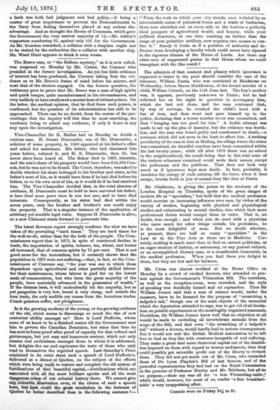Vice-Chancellor Sir R. Malin had on Monday to decide a
curious case. H. Stuart Duncombe, son of Mr. Duncombe, a solicitor of some property, in 1868 appeared at his father's office and asked for assistance. His father, who had dismissed him years before, refused it, and H. S. Duncombe, then 66, has never since been heard of. The father died in 1869, intestate, and the son's share of his property would have been £.24,834 Con- sols, but he was not to be found. The Court, therefore, was asked to decide whether his share belonged to his brother and sister, as his father's next of kin, as it would have done if he had died before his father, or to his own next of kin, as it would do if he had survived him. The Vice-Chancellor decided that, in the total absence of evidence, H. Duncombe must be held to have survived his father, to have lived seven years since he was last seen, and to have died intestate. Consequently, as his sister had died within the seven years, only the brother and brother's son could enjoy the property. That is a singular instance of the application of arbitrary yet sensible legal rules. Suppose H. Duncombe is alive, or a new Claimant starts forward to personate him.






























 Previous page
Previous page